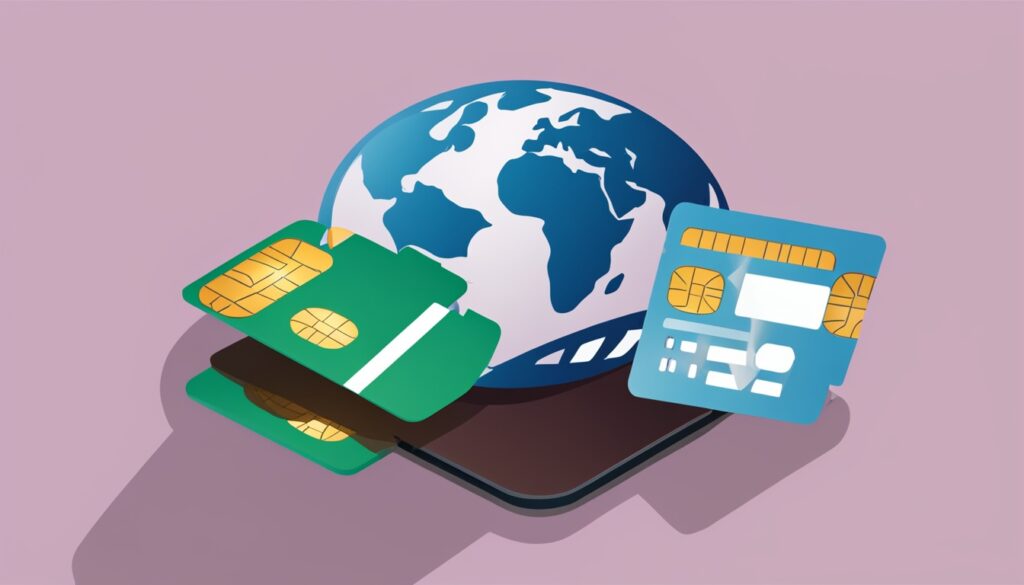Did you know that over 46% of millennials now see traveling as more important than before the pandemic? With more people traveling abroad, knowing how to handle your money is key. Choosing between credit and debit cards for your trip can greatly affect your experience and budget. This article will look at the good and bad of each option to help you pick the best for your travels.
Key Takeaways
- Credit cards often provide better exchange rates, traveler protections, and rewards than debit cards for international use.
- Debit cards can lead to unexpected fees such as ATM withdrawal charges and foreign transaction fees, which can add up quickly.
- Cash offers budget control but carries risks of loss or theft, while credit cards provide convenience and security benefits.
- Understanding the fees and rates associated with each payment method is essential for managing your travel expenses effectively.
- Utilizing a combination of payment options can help you maximize the benefits and minimize the drawbacks for your international trip.
Introduction to Traveling Abroad
Going on an international trip can be very rewarding. It’s full of excitement and the chance to explore new cultures and places. But it also has its own challenges, like getting used to new places and handling money in a foreign country. It’s important to plan your money well so you can enjoy your trip without worrying about costs or payment problems.
Excitement and Challenges of International Travel
International travel is exciting because you get to see new and interesting things. You can walk through lively markets or find hidden spots to eat. Every moment can make a memory that lasts.
But there are also challenges. You might face language barriers, cultural differences, and new customs. You’ll need to get used to different ways of getting around too.
Importance of Financial Planning for Trips
Planning your money is key to a worry-free trip abroad. You need to think about the cost of flights, where you’ll stay, what you’ll eat, and what activities you’ll do. Don’t forget about the cost of passports, visas, and travel insurance too.
It’s also good to know about currency exchange rates and how to avoid extra fees. This way, you can enjoy your trip without running into unexpected money problems.

“Traveling solo is all about the experience – making your own choices, solving your own problems, and embracing the freedom of the unknown.”
Debit Card Usage for International Travel
Debit cards are now a popular choice for travelers going abroad. They let you use your own money without the need for credit. But it’s key to know the good and bad sides of using them when you’re out of your home country.
Advantages of Using Debit Cards Abroad
- Access your bank funds directly, avoiding interest charges like with credit cards.
- Keep track of your spending and check your account balance easily while traveling.
- Foreign transaction fees might be lower than with credit cards, depending on your bank.
- They are widely accepted at merchants and ATMs around the world, though not as common as credit cards.
Disadvantages and Fees for Debit Card Use
Debit cards have their perks, but there are downsides to consider for debit cards for international travel:
- Risk of overdrawing your account if you don’t watch your balance closely.
- Many banks charge foreign transaction fees, usually 1% to 3% of the purchase.
- ATM withdrawal fees come from your bank and the local ATM, adding up fast.
- They often have less fraud protection than credit cards, leaving you liable for unauthorized charges.
- They don’t offer travel perks or rewards like credit cards do.
Knowing the advantages of debit cards abroad and disadvantages and fees of debit cards for travel helps you choose the best payment for your trip.

“Debit cards can be a convenient payment option for international travel, but it’s crucial to weigh the pros and cons before relying on them as your primary method.”
Credit Card Usage for International Travel
Credit cards can be a great tool for managing your money while traveling abroad. They offer many benefits that make your trip easier and safer. But it’s key to know the good and bad sides of using credit cards for travel.
Benefits of Using Credit Cards for Travel
One big plus of using credit cards for travel is the fraud protection they offer. Credit card companies have systems that quickly spot and stop suspicious activity. This keeps your money safe.
Credit cards also come with travel perks like free insurance, lounge access, and hotel upgrades. These perks can make your trip better.
Using credit cards can also save you money on currency conversion fees. Some cards don’t charge foreign transaction fees, making them a smart choice for spending abroad.
Potential Drawbacks and Fees
Even though credit cards are handy for travel, they have some downsides and fees. Foreign transaction fees can be 1-3% of your purchase, adding up fast. American Express and Discover might be harder to use because they’re not as widely accepted as Visa and Mastercard.
It’s easy to spend too much with credit cards, so watch your spending closely. Paying off your balance in full is key to avoiding interest charges. Dynamic currency conversion can also make exchange rates high, so be careful when buying things abroad.

“Carefully considering the benefits and potential drawbacks of credit cards is essential when deciding how to manage your finances while traveling internationally.”
Cash Usage for International Travel
When traveling internationally, cash is still a good choice, even with more people using cards. It’s handy for small buys like street food, tips, or getting around. Cash also keeps your spending private and is useful if a place doesn’t take cards.
But using only cash can be tough. You must plan to have the right money and types, and there’s a risk of losing it or having it stolen. According to recent data, Wells Fargo no longer has foreign currency cash on-hand available for over-the-counter same-day purchases, and account holders must order foreign currency cash at any Wells Fargo branch for branch pickup with delivery in 2-7 business days.
Finding the right mix of cash for international travel, debit cards, and credit cards is key to managing your money well. By thinking about the good and bad of each way to pay, you can spend wisely abroad and avoid extra fees.
“Some banks require enrollment for wire transfer services prior to travel, so it’s important to plan ahead and ensure your financial accounts are set up for international use.”
Cash is a useful part of your travel kit, but you should think about its pros and cons. Mix it with other ways to pay for a solid financial plan for your trips abroad.
- Wells Fargo can buy back unused foreign currency cash at branch locations (excluding coins).
- Foreign exchange rates change based on the currency pair, transaction size, payment method, and product type.
- Incoming wire transfers in foreign currency are turned into U.S. dollars using the current exchange rate without warning.
- Extra fees might be added by third parties or other banks for currency exchanges.
- Travel credit cards without foreign transaction fees are a good choice for saving money abroad.
- Using currency converter apps or checking exchange rates helps travelers see the true cost of purchases and understand any extra fees.
- Paying in your home currency can lead to extra fees, like around 6% on a transaction.
Foreign Transaction Fees and Exchange Rates
Traveling abroad can be thrilling, but it’s smart to know the costs. You should think about foreign transaction fees and currency conversion costs when planning your trip.
Understanding Currency Conversion Costs
When you pay for something in another country, you might face a fee, usually about 1%. This is called a foreign transaction fee. Also, changing your money to the local currency can cost more, up to 3.5% of what you spend.
For instance, spending $3,500 abroad with a 3% foreign transaction fee could mean paying $105 in extra fees. These costs can add up fast, especially if you travel a lot.
Strategies to Minimize Fees
There are ways to lessen the effect of foreign transaction fees and currency conversion costs on your trips:
- Choose a credit card that doesn’t charge foreign transaction fees, like the Delta SkyMiles® Blue American Express Card.
- Take out local currency from ATMs instead of using currency exchange services, which have higher fees.
- Avoid Dynamic Currency Conversion (DCC) at checkout, as it can lead to extra charges on top of your card’s fees.
- Look up and compare exchange rates to get the best deal when changing your money.
By knowing these tips and using them, you can make the most of your money and enjoy your travels without worrying about surprise fees.
Travel Insurance and Protections
When you travel abroad, think about the insurance and protection you can get. Credit cards often offer travel insurance that can help you. This insurance can protect your money and give you peace of mind if things go wrong during your trip.
Credit Card Travel Insurance Benefits
Many credit cards have travel insurance benefits. These include:
- Trip cancellation/interruption insurance: If your trip is canceled or cut short for reasons like illness, injury, or job loss, it can reimburse your non-refundable costs.
- Lost or delayed baggage coverage: If your luggage is lost, stolen, or late, you can get reimbursed.
- Rental car insurance: Covers damage or theft of a rental car if you pay with your credit card.
Knowing what your credit card travel insurance covers can help you decide how to pay for your trips. This insurance is very useful if something unexpected happens during your trip.
A recent report found that travel insurance costs 4–10% of your trip’s total cost. There are many insurance options that protect against trip delays, missed flights, and changes in plans. These policies work even if you have other insurance.
When picking travel insurance, read the policy details and know what’s not covered. The pandemic has changed travel insurance, so it’s important to stay updated. This way, you can make sure you have the right protection for your trips abroad.
Safety and Security Considerations
When you travel abroad, keeping your money safe is key. Debit cards link directly to your bank account. This makes them more at risk of fraud, which could lead to big financial losses. Credit cards, on the other hand, have strong fraud protection and dispute resolution options. This means you’re often not liable for unauthorized charges.
It’s important to know how different payment methods protect you. This knowledge helps you choose wisely and stay safe while spending money abroad. By understanding the safety and security aspects, you can travel without worry.
Fraud Protection and Dispute Resolution
Credit cards offer better fraud protection and dispute resolution than debit cards. If your credit card gets lost or stolen, you’re only on the hook for up to $50 in unauthorized charges. Many credit card companies will even waive that amount. Debit card fraud, however, can drain your account, causing trouble during your trip.
- Credit cards use chip-and-pin technology to prevent unauthorized use.
- Most credit card companies have fraud detection and dispute teams to quickly address issues.
- If there are unauthorized charges, you can dispute them and get a temporary credit while it’s looked into.
Knowing what each payment method offers in terms of security helps you make smart choices. This way, you can enjoy your travels without worrying about your money’s safety.
“Always cover your drink with your hand and watch it to avoid potential drugging with substances like Rohypnol, ketamine, and scopolamine that render a person unconscious and defenseless.”
| Metric | Percentage |
|---|---|
| Travelers who connect their devices to public networks during international travel | High |
| Public networks in hotels, airports, and other public places with minimal security measures | High |
| Travelers who consider leaving their data and devices at home for security reasons | Significant |
| Travelers who back up their data before traveling | High |
| Travelers who install and configure encryption software on their devices | Considerable |
| International travelers who use campus VPN software for added security | Significant |
| Travelers who print backup passcodes for 2-step authentication | Considerable |
| Devices configured according to the minimum security standard for foreign travelers | Significant |
| Travelers who do not leave their devices unattended during the trip | High |
| Travelers who avoid entering credentials into public computers | Considerable |
| Travelers who connect only to known wifi networks | Moderate |
| Travelers who turn off wifi when not in use to avoid security risks | Considerable |
| Travelers who use VPN software to establish a secure network connection | High |
| Travelers who use a non-privileged account on their devices for added security | Considerable |
| Travelers practicing safe web browsing by connecting to HTTPS websites | High |
| Travelers who clear browsing session information on public devices to protect data | Considerable |
Which Should You Use for International Travel?
Choosing between a credit card and a debit card for international travel depends on several factors. These include costs, fees, travel benefits, your budget, and the convenience and security of each option. By looking at these factors, you can pick the best payment method for your travel needs and finances.
Factors to Consider When Deciding
Here are key points to think about when picking between credit and debit cards for international trips:
- Fees and Costs: Look at the foreign transaction fees, ATM withdrawal fees, and other charges for each card. Some credit cards, like the AAA Cashback Visa Signature® Card, have no foreign transaction fees.
- Travel Benefits and Protections: Credit cards often come with travel insurance, rental car coverage, and emergency help. Debit cards usually don’t offer these benefits.
- Budgeting and Spending Habits: Credit cards make it easier to keep track of your spending. Debit cards are better for those who want to stick to a budget.
- Convenience and Security: Credit cards have better fraud protection and ways to resolve disputes than debit cards. They’re also more widely accepted around the world.
Think about these points to decide which payment method best fits your international travel needs and financial situation.
| Feature | Credit Cards | Debit Cards |
|---|---|---|
| Foreign Transaction Fees | 0% to 5% of the purchase amount | 0% to 5% of the purchase amount |
| Travel Benefits | Travel insurance, rental car coverage, emergency assistance | Limited to no travel-related benefits |
| Fraud Protection | Stronger fraud protection and dispute resolution processes | May have limited fraud protection compared to credit cards |
| Acceptance | Widely accepted globally | May not be accepted in some locations |
| Budgeting | Can make it easier to track and manage spending | May help with more disciplined spending habits |
Tips for Overseas Spending
Traveling abroad is thrilling but needs careful money planning. Here are some tips to help you manage your spending and keep your finances in check.
Budgeting and Tracking Expenses
Start by making a detailed budget for your trip. Include costs for places to stay, getting around, food, and fun activities. Don’t forget to add in any extra fees for foreign transactions or currency exchange. While traveling, use a budgeting app or spreadsheet to keep track of your spending. This helps you stay within your budget.
Using Mobile Banking Apps Abroad
Use mobile banking apps to keep an eye on your money while you’re away. Many banks, like TD Bank, let you check your balance, move money, and get alerts on any strange activity. This keeps you informed and lets you quickly fix any problems.
TD Bank also offers great tools for travelers, including:
- Competitive exchange rates for over 55 currencies
- Immediate in-person exchange for common currencies
- Options for online and in-store foreign currency ordering
- Credit and debit cards with no foreign transaction fees
- Contactless and chip technology for added security
- Emergency contact information for lost or stolen cards
These tools help you manage your spending and keep your money safe while you’re exploring.
“Staying organized and proactive with your finances is key to a stress-free international trip.”
Planning ahead, tracking your spending, and using available resources are key to successful spending abroad. With the right strategies, you can enjoy your travels without worrying about money.
Case Studies and Real-Life Examples
Traveling internationally can be tricky, and picking the right payment method is key. Let’s look at some real-life examples to understand the pros and cons of using credit cards versus debit cards abroad.
Emma, a world traveler, faced a problem when her debit card was declined in Paris. She didn’t know about the foreign transaction fees her bank charged. This made her look for a better credit card for her travels.
John, however, liked using his debit card for travel. In Tokyo, he avoided worrying about credit card limits and interest rates. But he found it hard to use ATMs and deal with the exchange rates.
| Scenario | Credit Card | Debit Card |
|---|---|---|
| Foreign Transaction Fees | Typically lower or waived | Often, higher fees |
| Fraud Protection | Stronger liability protection | Limited liability protection |
| Rewards and Perks | Offers travel rewards, insurance, and other benefits | Lacks these additional perks |
| Acceptance | Widely accepted globally | May face limited acceptance in some regions |
These examples show the complex choices travelers face when picking between credit and debit cards for trips abroad. Knowing the benefits and drawbacks of each can help you choose what’s best for your travel and money needs.
“The right payment method can be the difference between a seamless financial experience and one fraught with unexpected challenges.”
Conclusion
Choosing between a credit card and a debit card for international travel depends on your needs and finances. Each payment method has its pros and cons. The best choice for you depends on your trip type, spending habits, and what you need in terms of protection and benefits.
Think about the fees, security, and travel perks when deciding. This will help you manage your money well and enjoy your trip without worries. You might choose a credit card for rewards and protection or a debit card for better spending control. Just plan ahead and know what your choice means.
The world is easier to reach now, thanks to air travel and the chance to see different cultures. With smart money management and an open mind, your trips can be memorable and broaden your view. So, get excited, adapt, and start your journey with confidence. You’re ready to handle the financial side of traveling abroad.
FAQ
What are the advantages of using a debit card for international travel?
Using a debit card abroad has many benefits. You won’t face interest charges. It’s easy to keep track of your spending. Plus, you might pay less in fees than with credit cards.
What are the disadvantages of using a debit card for international travel?
Debit cards have some downsides. You could overdraft your account. Foreign transaction fees might be higher. They also don’t offer the same fraud protection or travel perks as credit cards.
What are the benefits of using a credit card for international travel?
Credit cards offer great perks when you’re traveling. They have strong fraud protection. You get travel insurance and other benefits. They also let you use favorable exchange rates. And they can cover unexpected costs or emergencies.
What are the potential drawbacks of using a credit card for international travel?
Credit cards have their downsides too. You might spend more than you can afford. There are foreign transaction fees. And, if you don’t pay off your balance, you’ll face interest charges.
What are the advantages and disadvantages of using cash for international travel?
Cash is handy for small purchases like street food or tips. It doesn’t leave a digital trail. It’s useful if some places don’t take cards. But using only cash can be hard. You need to plan for enough cash. And it can be lost or stolen.
How can you minimize foreign transaction fees and exchange rate costs when traveling internationally?
To cut down on fees and costs, use cards with no foreign transaction fees. Look for good exchange rates. And plan to use less currency conversion.
What travel-related insurance and protection benefits do credit cards offer for international travel?
Credit cards often come with travel benefits. These include trip cancellation or interruption insurance. And coverage for lost or delayed bags. Knowing what your card offers can help you choose the best payment method for your travel.
How do the security features of debit cards and credit cards compare for international travel?
Debit cards link directly to your bank account. This makes them more vulnerable to fraud. You could lose money right away if your card is stolen. Credit cards have better fraud protection. They limit your liability if someone uses your card without permission.
What are the key factors to consider when deciding between a credit card or debit card for international travel?
Think about the costs and fees of each card. Look at the travel benefits and protections. Consider how they affect your budget and spending. And think about the convenience and security each offers.
How can you effectively manage your finances and spending while traveling internationally?
Make a detailed budget and track your spending. Use mobile banking tools and apps. This helps you stay on top of your money and keep your spending in check.



